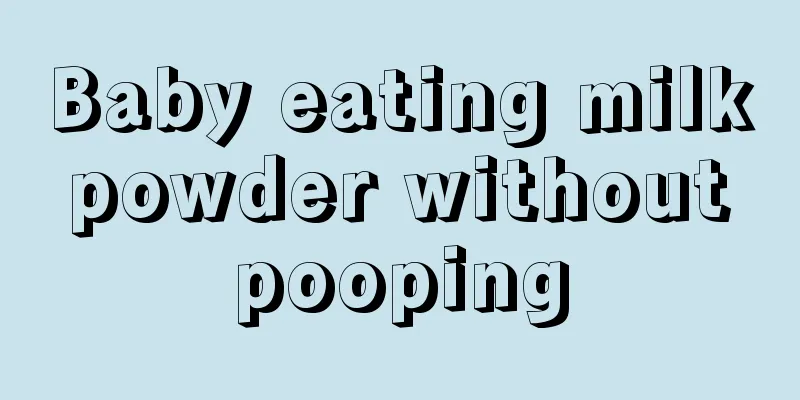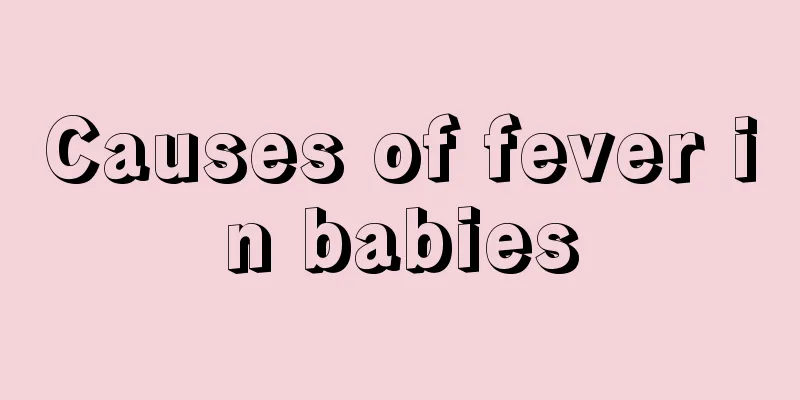What to do if your child keeps vomiting

|
Why do children always vomit? Children's body resistance is relatively weak, and they are easily invaded by various germs, which affects their health. Vomiting and diarrhea in children are very common clinical symptoms, but if vomiting occurs frequently, parents need to pay attention. Vomiting may be a sign of a certain disease or intestinal infection, or it may be poisoning. Therefore, we need to know what is going on and then carry out targeted treatment. Let’s learn about it together. Why does the child keep vomiting? 1. Children who vomit frequently may have a neurological disease Central nervous system diseases such as encephalitis, meningitis, intracranial hemorrhage or tumors, and craniocerebral trauma can also cause vomiting, which is characterized by no nausea before vomiting and projectile vomiting, but is often accompanied by other symptoms of the nervous system, such as headache, mental depression, drowsiness, and even convulsions and coma. 2. If a child keeps vomiting, it may be poisoning Including various poisonings, such as food poisoning, poisonous animals, plant poisoning, drug and pesticide poisoning, etc., almost all of which have vomiting symptoms, but different poisonings have their own clinical characteristics for identification. 3. Children's frequent vomiting may be caused by colds or other respiratory infections Respiratory infections may also cause vomiting because babies can easily become nauseated due to a blocked nose. Why does the child keep vomiting? 4. Children who vomit frequently usually have bacterial infection in their intestines. Usually the intestines are infected by bacteria, which may be foreign or internal to the baby's intestines. It has the ability to self-protect against bacterially contaminated intestines and the ability to resist infection, which is a self-protection function. It manifests itself in the baby's sudden vomiting for one to two days, often accompanied by fever, diarrhea and other symptoms. What to do if your child keeps vomiting: 1. When a child vomits, parents should let the child rest as much as possible and not let him eat anything. This will be better. 2. Take your temperature every half an hour. 3. If the body temperature is normal, feed water every half an hour, 30-50 ml per cup is enough, add a small amount of sugar and salt, and the water temperature should not be too cold. 4. Try to let your baby rest, don't disturb him, and don't change the baby's position frequently, otherwise it will cause the baby to vomit again. Why does the child keep vomiting? 5. Symptoms will be relieved after a few hours. But try to prolong your child's fasting time and don't feed him/her as soon as the condition improves a little. But try to extend the time your child is fasting. If the child has a high temperature, it means that there is inflammation. Try not to take medicine on your own if there is inflammation. The child is relatively young, and indiscriminate use of medicine can be very harmful to the health of the body. It is recommended to go to a nearby hospital for a detailed examination and follow the doctor's advice. Care: 1. Feed water frequently, drink small amounts frequently, and ensure water supply to prevent excessive water loss and dehydration. The water temperature should be hotter in winter and cooler in summer. Warm water can easily cause vomiting. 2. Pay attention to your diet, don’t eat too much, and try to eat small meals frequently. Do not eat greasy, spicy or sour foods to avoid irritating the stomach and intestines. After vomiting, you should first eat liquid food or semi-liquid food (such as rice porridge or noodles), and gradually transition to a normal diet. 3. Rest in bed as much as possible and avoid changing body position frequently, otherwise it will easily cause vomiting again. Vomiting in children is often caused by digestive dysfunction, so when a child vomits, the first thing to do is to temporarily fast to give the digestive tract some time to rest. You can first give the child some light sugar salt water or light tea, and the child will be fine after a few hours or 1 to 2 days. |
<<: The child always sniffs his nose
>>: How do children grow taller?
Recommend
How long can a child with hemolysis live?
Hemolysis usually occurs in babies and can cause ...
What to apply when a child is bitten by a mosquito
There are a lot of mosquitoes in the summer. Even...
Why does my child suddenly urinate frequently?
Parents certainly hope that their children can be...
14 types of children are born with high IQ, don't bury your children
Many children are born with high IQs, which requi...
What's on the baby preparation checklist?
Before the newborn baby makes a sound, expectant ...
There is a bump on the back of the baby's head
Many parents have found that their children have ...
Why does the child's leg hurt?
Children will always experience physical pain dur...
Dietary considerations for children with bronchial asthma
Bronchial asthma is a respiratory infection disea...
The child has a stomachache and vomits
Babies are very prone to illness during their gro...
How can primary school students better supplement their brains?
Many people have their own opinions on brain supp...
What should I do if my baby has baldness on the back of his head?
When facing the problem of baby's baldness on...
What should I do if my baby has a fever and poor appetite?
Many babies often cannot get rid of their fever o...
What to do if your child's scrotum is red and swollen
Children are prone to many diseases. When treatin...
What to do if baby's milk supply decreases in summer
In the summer, due to the extremely hot and dry w...
Treatment of myocarditis in children
Children are in a period of rapid growth and thei...









